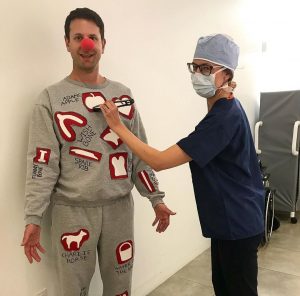A personal account of Bruno, an international student
Picture: courtesy of Bruno Pozzani
Bruno Pozzani gives his insight on his understanding of the English language.
March 31, 2022
“The word ‘shoes’ is something so common in the English language. However, shoes in the military are not simply part of an outfit, they signify who you are. Shoes in the military mean hard work, discipline and attention to detail in one simple place, your foot. In the military, they must learn how to shine their shoes which they must polish to a point where you can see your teeth lines through them. The process is straightforward. One gets the polish, gets it wet with either water or, if you are lazy, spit, and scrubs the polish in circles. If you are a beginner, it takes around 30 minutes. However, if you are experienced, it can take 5 to 15 minutes. As an international student, my experience learning this process was frustrating, but now looking back, it was funny.
I was born and raised in Brazil, and I was 15 years old when my parents and I decided that I would study in a military school in the United States. When I tell this to people, they think that I was a bad kid and my parents wanted to discipline me. It was the opposite – I wanted to learn English, learn the American culture and build good traits such as discipline, organization and mental strength. When I went to the United States, I knew essential words such as ‘sun,’ ‘dog,’ and ‘food.’
When I got to the military school, I got there one week behind because I received my visa late, but they were nice. At least, I thought because I didn’t understand what they were saying anyway. I was able to grasp the important information on who my leader was (the person overseeing my military tasks) and where my room was. When I got to my room, my leader showed me where my clothes, shoes and bed were. My leader, a Sergeant, had a very serious and mean face. I just thought he was having a bad day. In a couple of days, I accepted that his face was just ugly like that. He gave me a book called the handbook (the instructions for making things in the military), but I didn’t understand anything in that book. Luckily, I learned how to make my bed and wear my uniform correctly with my parents before going to military school, but I was going to learn about shoes at the school. So, as soon as I arrived, I organized my bed the proper way, I wore the uniform correctly and I was waiting for the Sergeant to teach me how to make my shoes shiny like in the movies. The Sergeant arrived and was happy with my accomplishments. I didn’t see a smile, but I could tell that he was smiling with his eyes. So, he got the shoes in his hand and said something along the lines of “get your shoes, and with the polish in the center of the hall, you can use the polish with a little water or spit and get your shoes shined. Use the sunlight to see the missing spots, got it?” I nodded. I thought I understood. I understood some words, and they all made sense in my head. I understood ‘shoes,’ ‘shine,’ ‘sun,’ and ‘got it.’ When I was in Brazil, we learned that we only used the word ‘shine’ for the sun, “the sun shines bright.” Surprisingly, you can also use the word shine for shoes. The result of my conversation with the Sergeant was to put my leather shoes outside in the sun.
After putting the shoes in the sun, I went to see the Sergeant. When I saw him, I said, ‘shoes good’ and put my thumbs up. The Sergeant wasn’t surprised that I finished my shoes in 15 minutes because I also finished the other tasks quickly. He was happy with his eyes that I was done. So, he told me to go to the barber to get the worst haircut of my life. I went back to my room, and it was already late. It was Taps (the time that we went to bed). That night, there was a rainstorm, and I completely forgot about my shoes that were outside. I was focused on everyone around me and that I was hundreds of thousands of miles far from home, so I slept.
The next day, we woke up at six, and a quarter from seven would be inspection with the Sergeant Major. I thought the Sergeant Major was the man who must be with the scariest and meanest face of all of them; for that reason, everyone feared him. I didn’t care; I just knew that he was the one who was going to do the inspections. Why should I be scared if I have everything under control? I have my bed made and am wearing my uniform correctly, and the only thing that I need to do is to get my shoes outside and bring them for inspection. When I went out, the rain destroyed my shoes. I started thinking about my options, and I had two: try to hide and be punished for hiding from the Sergeant Major and have my reputation as a scared baby or face the situation and deal with the consequences. I got back with wet, destroyed shoes on my feet with mud and some leaves. I got in front of my room as if I were ready for inspection. The Sergeant came through my room to see if everything was okay. When he finished, he went to see if my uniform was correct. The Sergeant looked down and saw my shoes. He looked scared, confused and angry. He started yelling some words that I didn’t understand, but I knew they were bad. However, it was already time for inspection, so he didn’t yell for long. He had to report to the Sergeant Major so that they could go through inspection together. The Sergeant Major inspected every detail for every student (room and uniform). When he came to examine me, he looked at me, looked at my shoes, and then looked to my Sergeant. He didn’t even check my room. The Sergeant looked at me as if he was going to kill me. I think if he could, he would have killed me that day. After inspection, everyone when to get food, and I went to play with the Sergeant. Because I shamed him in front of the Sergeant Major, I had to run around the battalion over three miles and do four times thirty push-ups and fifty sit-ups. I tried to explain to him what happened, but he saw it as if I was giving him attitude, so I made him madder. After this fantastic and informative experience, I was able to eat and learn how to shine my shoes the proper way and understand that we can use the word shine for shoes as well, and it means to polish the shoes, so it becomes shiny like the sun.
There are several words that international students do not understand or are confusing that, for Americans, are common words. For example, the question ‘what’s up?’ It is such a complicated question. What should I say? Should I tell a stranger about my life? From my experience, the best answer for the question ‘what’s up’ is ‘what’s up!’ ‘Spill the tea’ does not mean that you did something wrong, but it means to share gossip, which makes no literal sense. The sentence ‘can I help you’ can mean ‘go away; I am busy.’ My favorite one is the word ‘badass.’ The term ‘bad’ means poor quality or a low standard. The word ‘ass’ means anus. Yet, when they are together, it means that the person is amazing! However, the word ‘dumbass’ is the complete opposite. Learning English is not complicated, but the small and subtle things Americans use in their daily lives make things different and interesting. If you get anything from this story, understand that international students want to learn and are happy to talk to you, but if you are talking to them, and they do not understand, do not take it personally, and try to have the patience to explain to them what that word means.



